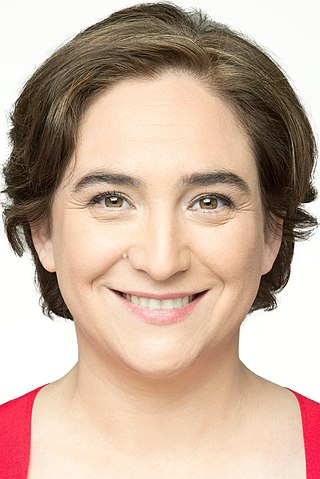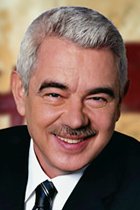The Republican Left of Catalonia is a pro-Catalan independence, social-democratic political party in the Spanish autonomous community of Catalonia, with a presence also in Valencia, the Balearic Islands and the French department of Pyrénées-Orientales. It is also the main sponsor of the independence movement from France and Spain in the territories known as Catalan Countries, focusing in recent years on the creation of a Catalan Republic in Catalonia proper. Its current president is Oriol Junqueras and its secretary-general is Marta Rovira. The party is a member of the European Free Alliance.
Municipal elections in Barcelona are held every four years to elect the city council. The mayor is elected indirectly by the councillors on the first plenary session of the term.

The Popular Unity Candidacy is a left-wing to far-left pro-Catalan independence political party active primarily in Catalonia, where it has political representation, but also in other autonomous communities in Spain it considers to be part of the Catalan Countries. The CUP traditionally has focused on municipal politics, and is made up of a series of autonomous candidatures that run in local elections. Its presence is strongest within the borders of Catalonia.

The 2015 Barcelona City Council election, also the 2015 Barcelona municipal election, was held on Sunday, 24 May 2015, to elect the 10th City Council of the municipality of Barcelona. All 41 seats in the City Council were up for election. The election was held simultaneously with regional elections in thirteen autonomous communities and local elections all throughout Spain.

The 1979 Barcelona City Council election, also the 1979 Barcelona municipal election, was held on Tuesday, 3 April 1979, to elect the 1st City Council of the municipality of Barcelona. All 43 seats in the City Council were up for election. The election was held simultaneously with local elections all throughout Spain.

The 1983 Barcelona City Council election, also the 1983 Barcelona municipal election, was held on Sunday, 8 May 1983, to elect the 2nd City Council of the municipality of Barcelona. All 43 seats in the City Council were up for election. The election was held simultaneously with regional elections in thirteen autonomous communities and local elections all throughout Spain.

The 1987 Barcelona City Council election, also the 1987 Barcelona municipal election, was held on Wednesday, 10 June 1987, to elect the 3rd City Council of the municipality of Barcelona. All 43 seats in the City Council were up for election. The election was held simultaneously with regional elections in thirteen autonomous communities and local elections all throughout Spain, as well as the 1987 European Parliament election.

The 1991 Barcelona City Council election, also the 1991 Barcelona municipal election, was held on Sunday, 26 May 1991, to elect the 4th City Council of the municipality of Barcelona. All 43 seats in the City Council were up for election. The election was held simultaneously with regional elections in thirteen autonomous communities and local elections all throughout Spain.

The 1995 Barcelona City Council election, also the 1995 Barcelona municipal election, was held on Sunday, 28 May 1995, to elect the 5th City Council of the municipality of Barcelona. All 41 seats in the City Council were up for election. The election was held simultaneously with regional elections in thirteen autonomous communities and local elections all throughout Spain.

The 1999 Barcelona City Council election, also the 1999 Barcelona municipal election, was held on Sunday, 13 June 1999, to elect the 6th City Council of the municipality of Barcelona. All 41 seats in the City Council were up for election. The election was held simultaneously with regional elections in thirteen autonomous communities and local elections all throughout Spain, as well as the 1999 European Parliament election.

The 2003 Barcelona City Council election, also the 2003 Barcelona municipal election, was held on Sunday, 25 May 2003, to elect the 7th City Council of the municipality of Barcelona. All 41 seats in the City Council were up for election. The election was held simultaneously with regional elections in thirteen autonomous communities and local elections all throughout Spain.

The 2007 Barcelona City Council election, also the 2007 Barcelona municipal election, was held on Sunday, 27 May 2007, to elect the 8th City Council of the municipality of Barcelona. All 41 seats in the City Council were up for election. The election was held simultaneously with regional elections in thirteen autonomous communities and local elections all throughout Spain.

The 2011 Barcelona City Council election, also the 2011 Barcelona municipal election, was held on Sunday, 22 May 2011, to elect the 9th City Council of the municipality of Barcelona. All 41 seats in the City Council were up for election. The election was held simultaneously with regional elections in thirteen autonomous communities and local elections all throughout Spain.
The 1931 Spanish local elections were held on 12 April throughout all municipalities in Spain to elect 80,472 councillors. The elections were perceived as a plebiscite on the monarchy of Alfonso XIII. After republican parties and their allies came away with a convincing victory, the king left the country and the Second Spanish Republic was proclaimed. A provisional government was formed shortly thereafter, with national elections scheduled for later in the year.

The 1934 Barcelona City Council election was held on Sunday, 14 January 1934, to elect the Barcelona City Council, the unicameral local legislature of the municipality of Barcelona, together with the other 1,029 Catalan municipalities. At stake were all 40 seats in the City Council, determining the Mayor of Barcelona. These were the first local elections where women were able to vote.

The Catalan Republic was a state proclaimed in 1931 by Francesc Macià as the "Catalan Republic within the Iberian Federation", in the context of the proclamation of the Second Spanish Republic. It was proclaimed on 14 April 1931, and superseded three days later, on 17 April, by the Generalitat de Catalunya, the Catalan institution of self-government within the Spanish Republic.

Ernest Maragall i Mira is a Spanish economist, politician, member of the Parliament of Catalonia and former Minister of Foreign Action, Institutional Relations and Transparency of Catalonia. He was previously Minister of Education, a member of the European Parliament and a member of Barcelona City Council (BCC).
Events from 1931 in Catalonia.
Events from 1934 in Catalonia.

The National Front of Catalonia is a Catalan far-right and pro-independence political party, presented in 2013. It had a local councilor in Ripoll between 2019 and 2020. Their main ideological principles are Catalan nationalism and opposition to irregular immigration.















